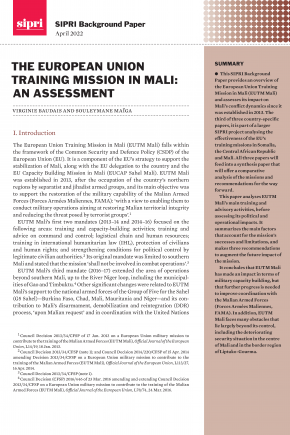The European Union Training Mission in Mali: An Assessment
This SIPRI Background Paper provides an overview of the European Union Training Mission in Mali (EUTM Mali) and assesses its impact on Mali’s conflict dynamics since it was established in 2013. The third of three country-specific papers, it is part of a larger SIPRI project analysing the effectiveness of the EU’s training missions in Somalia, the Central African Republic and Mali. All three papers will feed into a synthesis paper that will offer a comparative analysis of the missions and recommendations for the way forward.
This paper analyses EUTM Mali’s main training and advisory activities, before assessing its political and operational impacts. It summarizes the main factors that account for the mission’s successes and limitations, and makes three recommendations to augment the future impact of the mission.
It concludes that EUTM Mali has made an impact in terms of military capacity building, but that further progress is needed to improve coordination with the Malian Armed Forces (Forces Armées Maliennes, FAMA). In addition, EUTM Mali faces many obstacles that lie largely beyond its control, including the deteriorating security situation in the centre of Mali and in the border region of Liptako-Gourma.
I. Introduction
II. Background
III. EUTM Mali’s activities
IV. The impact of EUTM Mali
V. Explanatory factors behind the impact of EUTM Mali
VI. Conclusions


